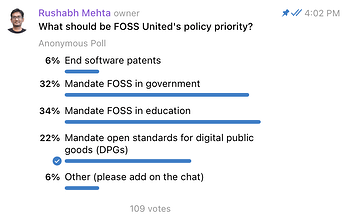FOSS United’s Public Policy objectives are to:
- Build a powerful voice for FOSS United in policy discussions that impact the Free and Open Source Software community in India
- Build coalitions with industry, academia and policy makers in key areas like Open Tech, Open Standards, FOSS & Software Patents to defend and grow the FOSS movement
- Mentor a new generation of FOSS Policy advocates
Under Objective # 1 of building a powerful voice for FOSS, we are working with the Prof. Arul Scaria and his team at the National Law School (NLS) on a report on the impact of FOSS on India. The report is expected to be completed in the last quarter of 2024 and will be widely circulated among policy makers and think tanks. It will draw upon existing research like the recent study released by Harvard Business School and University of Toronto, titled The Value of Open Source Software, which found that the value created by FOSS is around $8.8 trillion. Leading IT organizations in India will also be interviewed for this report. A similar FOSS impact study done by IIMB in 2009 found that India can save $1 billion per annum by adopting FOSS. In the 15 years since the IIMB report was published, the importance of FOSS has increased dramatically. Therefore, we expect the current numbers to be much higher.
FOSS is a commons-based public good like air and water. The value of these public goods is realized only when the Air Quality Index (AQI) degrades, or when the taps run dry. By surfacing the value of these goods, and making it more explicit, we hope to help Indian policy makers realize the value of FOSS in terms of protecting India’s digital sovereignty, reducing barriers to entry, and supporting government initiatives like Atmanirbhar Bharat, Startup India and Digital India. We will be supporting Prof. Scaria and NLS with inputs and introductions to the FOSS ecosystem for this study.
For Objective # 2, we do weekly outreach to industry, academia and think tanks to generate support for the End Software Patents (ESP) coalition. This is a slow process given the low awareness of this issue. However, as can be seen from the quotes that we have received, we now have support from opinion leaders whose words carry weight with the Indian government. In the next few months, we expect to see more individuals and organizations follow suit. We are also working with NLS and its students to do periodic reviews of software patents. An earlier effort to work with volunteers to do software patents did not take off because of unfamiliarity with the subject but we will continue exploring this path. Through the ESP effort we are building institutional relationships that will help our public policy advocacy in the long run. Post elections, we also plan to step up our outreach to state governments.
Even as we build coalitions with external stakeholders, we also have a big task ahead in terms of educating Indian FOSS developers on the risks of software patents, and how they go against the Four Freedoms of FOSS. Our volunteer, Rahul Sai Poruri gave a talk on software patents at the ChennaiFOSS 2.0 event held on 6th April, 2024, while Akhilesh G spoke on the subject at the FOSS United Kochi event held in November, 2023. We plan to conduct more such sessions within the FOSS community in the current year.
On Objective # 3, we are now in our sixth cycle of sponsoring engineers and FOSS developers for the The Graduate Certificate in Public Policy (Technology and Policy) at Takshashila. This was prompted by the observation that very few engineers participate in public policy discussions, which are mostly dominated by lawyers. Given the central role that technology now plays, we felt there is an urgent need to involve more engineers in public policy. Applications for the May to July 2024 cohort of GCPP are now open. While there is no strict quid-pro-quo that the sponsored candidates have to volunteer for FOSS United, we do see some interest from the Takshashila cohort. Rahul Sai Poruri is an active volunteer, while Akhilesh G has also contributed in the past. This is an ongoing process. Given the nature of pro-bono, volunteer activity, contributions ebb and flow. Therefore, we are constantly on the lookout for volunteers and aim to build a strong cadre over the next few years.
How can you help?
If you have made it thus far, thanks for your interest in FOSS United’s Public Policy initiatives. Here are the ways in which you can help:
- Let us know what kind of public policy initiatives you look forward to.
- If you know of academics and industry leaders who can support our End Software Patents campaign, please connect us to them. We can be reached at publicpolicy@fossunited.org.
- If you are an engineer, or a professional with knowledge of software patents, help us review and evaluate software patents.
- Help us by writing blog posts and reviewing software patents for the End Software Patents website.
